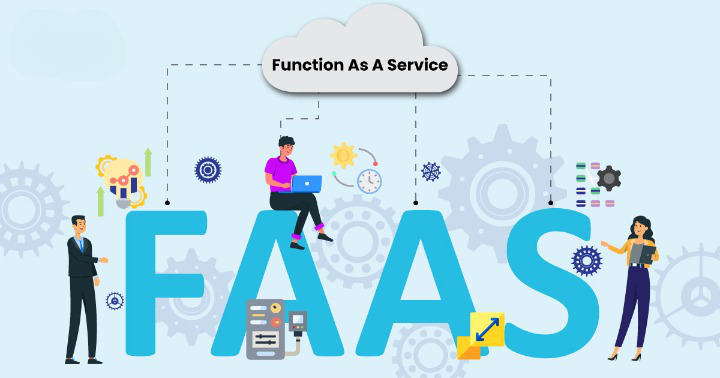
Function-as-a-Service: What is it and Who Uses it?
Function-as-a-Service (FaaS) is a cloud computing service that allows developers to run code without needing to manage or maintain their own infrastructure. FaaS provides a convenient way to run functions and applications in the cloud, with the main benefit being reduced development time, cost savings, and scalability. FaaS is used by developers and businesses of all sizes, from small startups to large corporations. In this blog post, we will discuss what FaaS is, its main benefits, its features, and who uses it.
What is Function-as-a-Service (FaaS)?
Function-as-a-Service (FaaS) is a type of cloud computing service that allows users to deploy and execute individual functions without having to manage the underlying infrastructure. FaaS can be thought of as “serverless” in that it does not require the user to manage servers or virtual machines, but instead provides the user with an API and set of programming languages to create and execute individual functions. Common examples of FaaS providers include Amazon Web Services (AWS) Lambda, Microsoft Azure Functions, OpenFaas, and Google Cloud Functions.
FaaS has become increasingly popular in recent years due to its ability to rapidly deploy code, reduce operational costs, and scale quickly in response to changing demands. FaaS functions can easily be chained together to form complex applications, allowing developers to focus more on creating business value and less on managing infrastructure. In addition, FaaS can also be used in conjunction with other cloud services such as databases, file storage, and serverless compute, allowing users to quickly create comprehensive applications.
The Main Benefit of FaaS:
Function-as-a-Service (FaaS) is a cloud computing service that allows users to run code or build applications without the need to manage or maintain a server. This makes FaaS an attractive option for developers and businesses as it provides them with access to on-demand computing resources without the need for upfront investments or long-term commitments.
The main benefit of FaaS is its scalability. By using Function-as-a-Service, businesses can scale up or down their computing resources quickly and easily, making it ideal for applications or services that require a lot of computing power but do not need to run constantly. With FaaS, businesses are only charged for the resources they use when their code is running, making it a much more cost effective solution than serverless or other cloud computing options.
Function-as-a-Service is available from many different providers such as AWS, Azure, and open source solutions. Each platform offers its own unique features and advantages that make it easier for developers and businesses to utilize FaaS in different ways. For example, AWS Lambda provides an easy to use interface for creating and managing functions while Azure Functions offer powerful integration capabilities. Open source solutions such as Apache OpenWhisk provide developers with complete control over their FaaS environment.
No matter which platform you choose, FaaS can provide your business with the scalability and cost effectiveness needed to meet any computing needs you may have.
Features of FaaS:
Function-as-a-Service (FaaS) is a cloud computing model that enables developers to write code and execute functions on the cloud without having to manage or maintain the underlying infrastructure. FaaS provides a way to quickly and easily deploy applications, eliminating the need to manage servers and virtual machines.
FaaS has several features that make it an attractive option for developers. Firstly, it allows developers to write code in any language they choose, as long as it can be deployed on the cloud platform they use. Secondly, FaaS can scale automatically and on-demand, meaning that as usage increases, additional resources can be allocated to meet demand. Thirdly, FaaS is designed to only run code when required, meaning that you pay for what you use, rather than needing to reserve compute capacity or purchase servers in advance.
One of the most popular FaaS providers is Amazon Web Services (AWS). Their service, AWS Lambda, is a fully managed compute service that allows developers to run their code without having to worry about managing the underlying infrastructure. Microsoft Azure also provides a FaaS offering called Azure Functions. Additionally, there are numerous open source options such as OpenFaaS and Apache OpenWhisk.
Ultimately, FaaS provides an attractive option for developers who need to quickly and easily deploy applications with minimal management overhead. By providing an easy-to-use platform, FaaS makes it possible to focus on developing features and functionality instead of managing the infrastructure.
Who Uses FaaS?
Function-as-a-Service (FaaS) is quickly becoming one of the most popular and widely used cloud computing services. It has been embraced by a variety of companies and organizations, ranging from large enterprises to small startups.
FaaS can be used for a number of different tasks, such as web development, automation, machine learning, data processing, IoT applications, and more. Enterprises are drawn to FaaS because of its scalability, cost efficiency, and fast development time. Small businesses and startups also find FaaS to be a great solution for their needs as it reduces operational costs and allows them to focus on other aspects of their business.
The two major cloud providers offering FaaS are Amazon Web Services (AWS) and Microsoft Azure. AWS offers its own function-as-a-service offering called AWS Lambda. Microsoft Azure offers its own version called Azure Functions. In addition to these two major providers, there are a number of open source options available, such as OpenWhisk and IronFunctions.
Function-as-a-Service is a great solution for businesses that need to quickly develop applications without having to worry about the underlying infrastructure. It offers a great balance between cost efficiency and scalability, making it an attractive option for a wide range of organizations. Whether you’re a large enterprise or a small startup, FaaS is worth considering as part of your cloud computing strategy.
Read More: https://www.marketresearchfuture.com/reports/function-as-a-service-market-3324